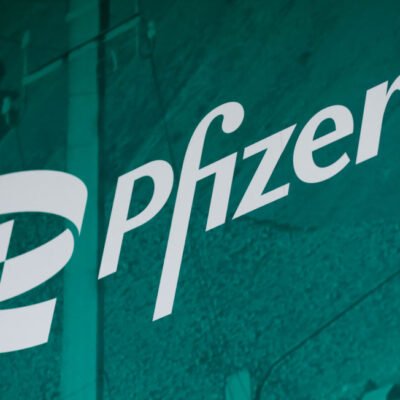There’s blood in the water. After a period of huge bullishness over generative AI, investors are starting to freak out about the massive costs involved, as evidenced by the reaction to Meta’s earnings yesterday.
To be fair, there’s more than one reason why the Facebook and Instagram parent’s share price took a 15% dip in after-the-bell trading, once its quarterly results were out. While Q1 revenues were strong, with no pullback in Chinese ad-buying, Meta’s Q2 guidance was a bit lower than Wall Street hoped to see. But the scale of its AI investment—with Meta’s estimate for the year now up 12% to $35 billion to $40 billion in spending and with next year’s outlay set to be even greater—is what proved truly sobering, especially with so little to show for it just yet.
CEO Mark Zuckerberg asked investors for patience and pointed out that Meta had “historically seen a lot of volatility in our stock during this phase of our product playbook where we’re investing and scaling a new product but aren’t yet monetizing it.” He also talked up the possibility of AI features in Meta’s apps attracting more users and therefore more ad revenue, and AI-powered smart glasses taking off, but that wasn’t enough to calm investors’ nerves.
“The disappointment on the revenue side is overshadowing any optimism about AI,” Cresset Wealth Advisors chief investment officer Jack Ablin told Bloomberg. “It’s hard to tell what the benefit will be to users, and while AI could ultimately mean some cost savings down the line, that isn’t visible yet.”
It is certainly true that big ideas need big investments, but if we’re talking this big, it’s very understandable that investors want to see some kind of solid strategy for profitability.
This is particularly true in the case of Meta, which—lest we forget—was until recently going all-in on the metaverse, another very expensive endeavor that has so far turned out to be a money pit (Meta’s Reality Labs division lost over $16 billion last year, and $3.85 billion in Q1). Yes, AI has way more immediate, demonstrable uses than virtual reality does, but seeing it as a profitable venture still requires a hefty dollop of imagination.
Another likely factor here is Meta’s open-source approach to releasing its Llama large language models. There are many real advantages to this, such as ensuring that there’s a powerful and attractive alternative out there to models from the likes of OpenAI and Google, and getting the wider community to help improve Meta’s AI. It may well pay off, but many investors will look at this strategy and ask where the moat is, and how Llama will make them tons of money.
Is the reaction to Meta’s outlay a damning indictment of Big Tech AI investments in general? We’ll see after Microsoft and Alphabet’s results later today, but it’s worth remembering that those companies are also major cloud providers whose AI capex will likely pay off one way or another. Meta may find itself in a similar position after its spending spree—Zuckerberg hinted at the possibility—but right now that’s not the business it’s in.
At this point it’s worth remembering that, like Elon Musk at Tesla, Zuckerberg is in the unusual position of being a law unto himself. Meta’s board can’t fire him, because of his voting control, and he has previously said that this allows him to take unpopular decisions that end up paying off. Meta’s vast AI expenditure could prove to be a serious test of that structure’s real utility, but either way, there’s nothing to stop investors from punishing the company if they don’t like what they see.
More news below.
David Meyer
Want to send thoughts or suggestions to Data Sheet? Drop a line here.
NEWSWORTHY
TikTok pulls ‘addictive’ reward program. TikTok has suspended a feature in its new TikTok Lite app—so far only available in France and Spain—that rewarded users for watching videos, with the reward points being redeemable against vouchers and gift cards. The European Commission had reacted to the launch with fury, arguing that the feature could prove “toxic and addictive” for young users and therefore breached the new Digital Services Act (DSA), which governs online content. Faced with a possible suspension if it couldn’t prove TikTok Lite wasn’t addictive, the company opted to just remove the feature, the Guardian reports. TikTok is still the subject of DSA investigations over this and other matters.
Schmidt backs AI-powered coding platform. Augment, which is taking on GitHub’s Copilot with its own AI-powered coding platform, has raised $252 million from investors including former Google CEO Eric Schmidt, TechCrunch reports. The round gives Augment a valuation of $977 million. Other participants include the likes of Index Ventures and Lightspeed Venture Partners.
Spotify vs Apple. Spotify says Apple has rejected a new version of its iOS app in Europe, which included information about Spotify’s pricing and its website. The European Commission last month fined Apple $2 billion for the “anti-steering” tactics under which it stopped music streamers from being able to tell customers about cheaper subscriptions outside of the iOS ecosystem. Apple has since said it would allow links to off-platform subscription deals but would charge developers a fat fee for external purchases. “Apple has once again defied the European Commission’s decision, rejecting our update for attempting to communicate with customers about our prices unless we pay Apple a new tax,” Spotify said, according to Reuters.
SIGNIFICANT FIGURES
150 million
—Threads’ monthly active user count, according to Mark Zuckerberg. The Instagram-linked X rival had 130 million MAUs in February, so it’s growing steadily rather than explosively.
IN CASE YOU MISSED IT
The CEO of OpenAI rival Cohere shakes off the haters: ‘We’re still sort of the underdog’, by Sharon Goldman
Rubrik valued at $5.6 billion after massively oversubscribed IPO prices above range, by María Soledad Davila Calero
Tesla driver said he was using Autopilot and looking at his phone before a crash that killed a motorcyclist, by the Associated Press
IBM shares fall after flatlining sales in its second-largest business unit, by Bloomberg
The AI frenzy could fall flat as companies hoard chips without enough data centers to host them, by Aroosh Thillainathan (Commentary)
BEFORE YOU GO
Net neutrality’s back. The Federal Communications Commission will today take its final vote on the reinstatement of net neutrality rules in the U.S., under which telecoms network providers won’t be allowed to favor certain online services over others in how they manage their traffic. Approval is certain due to the Democrats’ dominance at the FCC, so the Obama-era rules—suspended during the Trump era—will soon be back in place.
This is the web version of Data Sheet, a daily newsletter on the business of tech. Sign up to get it delivered free to your inbox.




